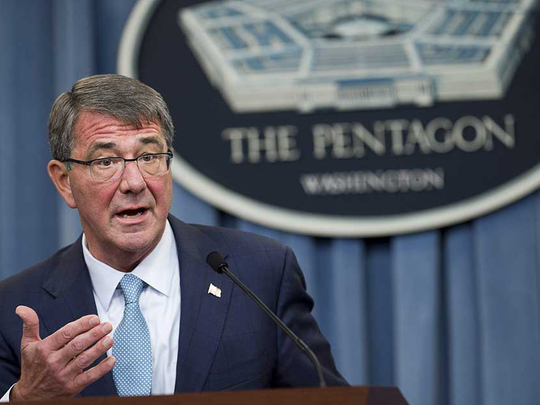
Warsaw, Poland: US Secretary of Defense Ashton B. Carter said on Thursday that the United States had “missed an opportunity” when it chose to shift air support from covering a group of US-backed rebels attempting to seize a key border town in Syria to striking a large Daesh convoy in Iraq.
Carter’s comments, made to reporters while on his way to the bi-annual North Atlantic Treaty Organisation (Nato) summit, was the most candid acknowledgement yet by the Pentagon that the United States had failed to adequately support one of their fledgling proxy forces on the ground during the recent operation.
On June 28 the Pentagon-backed group, called the New Syrian Army, drove more than 321km from their base on the Syrian-Iraq border to wrest the town of Al Bu Kamal from Daesh. Despite early gains, including seizing an abandoned airfield on the outskirts of the town, the unit of roughly 100 fighters was repelled the next day when Daesh counter-attacked, killing a handful of the rebels and capturing US-supplied weaponry and equipment.
Instead of circling overhead ready to support the fighters that had been promised air support, US bombers had been diverted to strike two large columns of Daesh vehicles fleeing the recently captured Iraqi city of Fallujah in the early morning hours of June 29.
US and British aircraft proceeded to join their Iraqi counterparts, who initiated the strikes, in destroying more than 500 vehicles and killing hundreds of fighters.
The bombardment, nearly unprecedented in the two-year conflict against the Daesh, was reminiscent of the Gulf War’s “Highway of Death.”
It is unclear how many civilians might have been killed.
“The allocation of forces is a daily tactical decision that commanders make,” Carter said, defending the decision to shift the US aircraft away from the tenuously positioned Syrian forces to striking Daesh militants outside of Fallujah.
“We have a lot of air assets and a lot of partners who have air assets, but on any given day they have to go to a certain place at a certain time,” Carter said, after being asked if the United States has enough aircraft to support multiple operations across Iraq and Syria. “But, circumstances change.”
Commanders in the New Syrian Army realised that US aircraft had left during the fighting, but were unaware they had been pulled away to attack a more tantalising target in Iraq.
Mohanned Tallaa, the group’s leader, said despite the bombers’ temporary absence they returned when he called them “right away.” When the New Syrian Army’s assaulted Al Bu Kamal, US aircraft carried out eight strikes around the town, while on the day they were routed there was only one, according to reports released by the US-led coalition.
The lack of US air support, however, was only one issue that plagued the rebels’ offensive.
Additional fighters, in the form of dormant resistance cells spread throughout Al Bu Kamal failed to arrive, said Abdul Salam Muzil, a fighter with a rebel group that formed the New Syrian Army. A radio station, called Al Bu Kamal liberation radio, was purposed to broadcast a call to arms when the New Syrian Army arrived on the outskirts of the town. The call, Muzil said, went unheeded.
Although the rebel forces were pushed out of the town and forced to drive back to their garrison at Al Tanf, the New Syrian Army characterised the attack a success, stating that it was meant to be a raid that penetrated into well-defended Daesh territory. However, before the offensive’s collapse, US military spokesman Col. Chris Garver said the operation was originally meant to “to liberate Al Bu Kamal and cut [the Daesh’s] military supply lines in the Euphrates Valley between Syria and Iraq.”
Garver told reporters on Wednesday that some aspects of the operation are ongoing and that it had managed to disrupt Daesh operations in the area.












